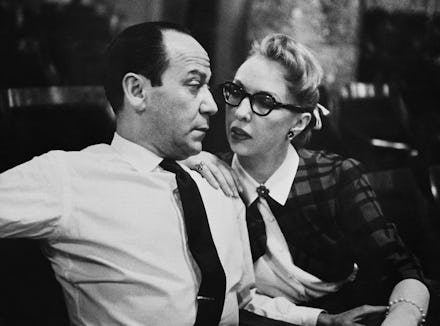'Baby, It's Cold Outside' Isn't Rapey; It's Practically Shakespeare

"Baby, It's Cold Outside" is a Christmas song that isn't even remotely about Christmas. Yet it may be the Christmas song of this century, and also the last one.
Why do I care about this song?
Well, every single year, about five new versions of this song pop up. It's a rite of passage for singers (the type of singers who put out Christmas albums, anyway).
And yet every year, someone calls the song "rape-y" which, to an English major like me, is important because to us every word has meaning. Rape-y is a thing. Rape is just about the worst possible act a person can do to another person, so if this song is really about date rape, why are all these people singing it every year? Are Willie Nelson and Norah Jones actually date rape apologists?! Is Lady Antebellum really advocating drugging each other so no one can leave the house??
Guys! No!
This song is so great because it's theater! It's a two-person scene that can mean basically anything depending on the version.
The song was written in 1944 by Frank Loesser and first sung by Loesser and his wife Lynn Garland. In 1944, the sentiments expressed in the song were not "rape-y." Young single women really couldn't be spending a lot of un-chaperoned time with men, and they definitely couldn't be instigating sexy late-night visits without breaking a whole host of rules regarding sex and romance. Since then, of course, social mores have changed. Ladies can stay as late as we want at a romantic interest's house, unless we're in high school. But honestly, the contexts for the song's writing in 1944 and its reception in 2013 barely matter.
Like a good Shakespearean play, "Baby, It's Cold Outside" is a tool that can express almost anything about a two-person romantic relationship. It has everything: will-they-won't-they drama, physical descriptions of a place, a comb. What changes, like good theater, are the goals, subtext, and stakes. Each artist can bring a new interpretation to the lyrics, depending on how they sing the song.
Case in point: the (potentially) most terrifying version ever, accompanied by a Misery-esque cartoon, in which Zooey Deschanel kidnaps and drugs M. Ward:
Scary. (Also, how is Deschanel allowed to still be adorable while committing felonies? I guess that's a discussion for another time.)
Now consider this traditionally-gendered version by Rufus Wainwright, who seems basically indifferent to his female companion in a way that makes you think, at some point, she's trying to convince him. When he sings "Baby, it's bad out there," it sounds like he's going to fall asleep. Sharon Van Etton seems to be making excuses to stay, trying to get Wainwright to notice her, while he's a lot more preoccupied with the developing storm outside. (I've been there, girl.) "Say darling can you lend me your comb?" while unbuttoning your top button is a classic stalling technique.
Spoiler, Sharon: He's not into girls. Nothing will work. Just go home and watch Love Actually or something.
Another way to change the relationship in "Baby It's Cold Outside" is to change the song's tempo. While Rufus lets the words ooze from his lips like molasses, Nick Lachey, and Jessica Simpson sing it so fast they can barely breathe. They are in a huge, huge hurry.
Their version seems to mean: "We know we have to say these words for the sake of decorum, so let's get through this as quickly as possible so we can just bone."
Others have contextualized the song by adding some playful banter, which in my opinion is like adding lines to Shakespeare. (SACRILEGE!) Here is a version that employs that technique as well as some laughing: Colbie Caillat and her buddy Gavin Degraw, who are both kind of laughing the whole time. These guys seem so happy to be hanging out. No one is going anywhere.
The gender-reversal technique, as seen above, is becoming the only socially acceptable way for hipsters to sing this song. Sometimes, it can be charming. The new Lady Gaga/Joseph Gordon-Levitt version has a bit of chemistry, in spite of Gaga's inability to walk down stairs.
Sometimes the results are ... less successful.
Last year, John Travolta and Olivia Newton-John did it, and their version came off as horrifying. Like I said, I don't believe in throwing around the word "rape-y," but Olivia seems to be threatening him with pneumonia and John really wants to leave. LET HIM LEAVE, OLIVIA.
My favorite gender-changed rendition is (and this is kinda embarrassing to admit) the Glee version. Two teenage boys in school uniforms somehow bring the correct level charm to the song; Kurt's perfect coyness makes the song romantic.
This version also underscores how unimportant the actual words they are saying are (as an English major, I reserve the right to directly contradict myself at all times). I mean, no one's lips are like "waves upon a tropical shore" and WHAT'S WITH THE COMB?
Plus no one is drinking, no one is smoking, no one is dying of pneumonia. This isn't a "no means yes" situation. It's all about the context, about the way that the two characters interact with each other.
I'm telling you, like Christmas Shakespeare, this song can represent a million different types of romantic interaction. That's why it keeps coming back every year. Some versions are horrible, and some are as totally amazing (see Baz Luhrman's Romeo+Juliet).
So Merry Christmas, English majors of the world. Let me play you out with the classic: Ella Fitzgerald. This is how it should be. Flirting between two consenting adults, neither of whom want to do anything but cuddle. You know why? Because it's cold outside!